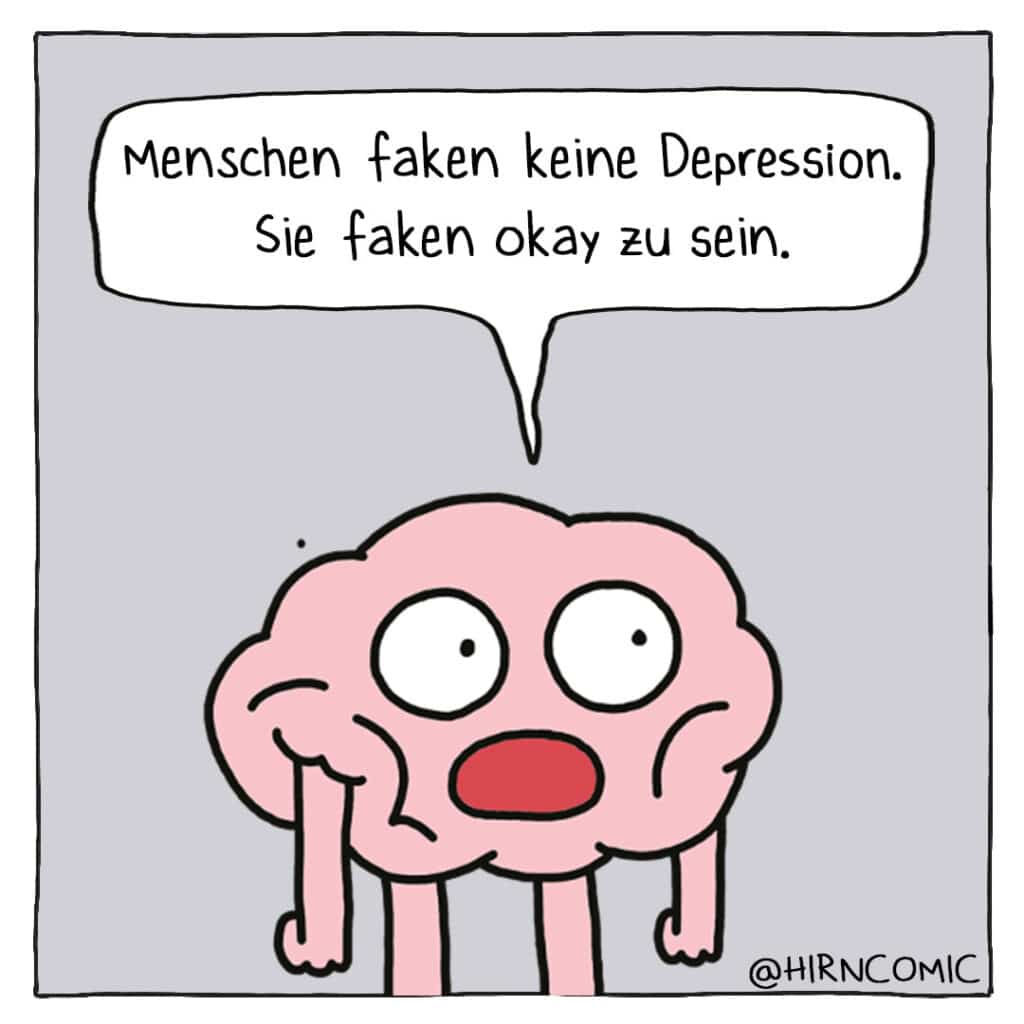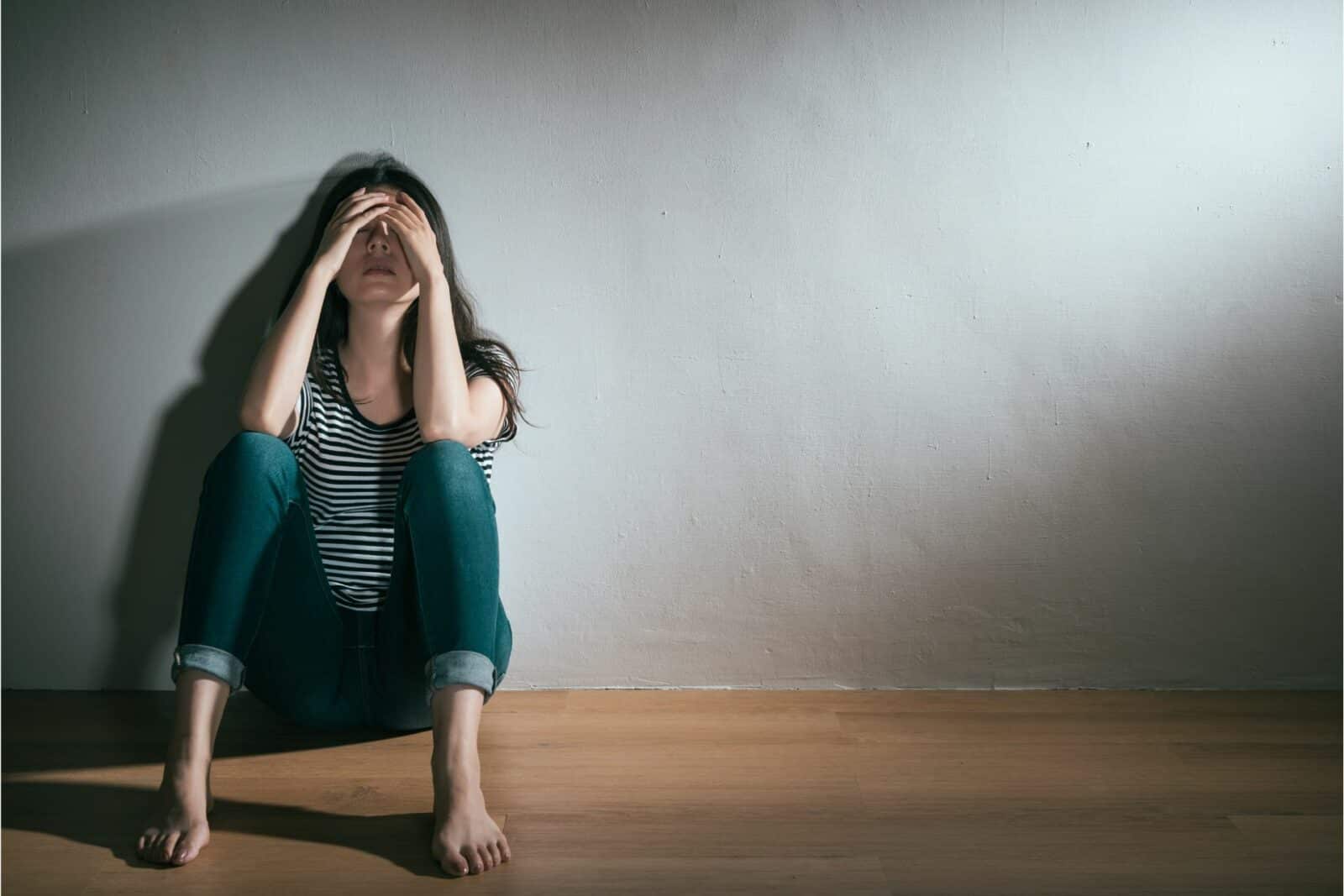The danger of suicide in depression is dealt with briefly and factually (not scenically), tips and help are named.
Life has become a tightrope act for me, every second I am afraid of falling. Who will catch me? Who will protect me? Who is there? No one. I can’t stand it! HELP!
These lines with the emotional expression of a deep depression come from my diary. They are over 20 years old and in the meantime – fortunately – no longer reflect my attitude to life. And yet, they give us a glimpse of how many people in our society feel on a daily basis, as depression has become mainstream.
Depression Day on October 1
In fact, they are among the most common and most underestimated mental illnesses in terms of severity! Currently, 11.3 percent of women and 5.1 percent of men in Germany are affected. Women thus suffer from depression about twice as often as men. In the course of a year, a total of 8.2 percent of the German population – i.e. 5.3 million people – have fallen ill.[1]
The day of the depression on 1 October moves this mental illness into the focus of the public, because many concerning do not go from shame and/or self stigma or ignorance immediately to the woman/to the physician and prolong so the own suffering. Good public relations can contribute to the necessary education and encouragement here.
The good news: depression is treatable and partly curable
The good news is that depression is a treatable condition. The earlier they are detected and thus treatment begins, the greater the chances of recovery. Psychotherapy and antidepressants can be used for this purpose. But rehabilitation sports for people with mental illnesses and other measures can also have a positive effect on the quality of life of those affected. That’s why it’s so important to seek professional help as early as possible. If you are unsure whether the permanently bad feeling actually represents depression, you can, for example, take an online self-test on the website of the Deutsche DepressionsLiga e.V. (German Depression League), the result of which provides an initial orientation.
Victims show their faces in social media campaign: You are not alone – We are many!

Mike Adamczak, 64, from Cologne, Germany, is also experienced with depression. But to simply surrender to one’s own suffering? Despite his own struggles with the disease and many a black day, it’s just not his thing. And so, on May 1, 2021, Mike launched his “Give depression a face” campaign for more tolerance of mental illness, in which more than 2,500 sufferers have already participated. I, too, was there with the addition of “bipolar depression” exactly one year ago.
The campaign photos with the names of those affected are shown on various social media channels, including Facebook, Instagram, X (formerly Twitter), Google, VERO, YouTube, and TikTok, reaching many people every day.
More about the campaign starter

But how does his own illness feel to Mike Adamczak? He himself says about this: “For me, my depression is like an unloved aunt who suddenly appears on my doorstep without an invitation, invites herself to my house for coffee and then just talks about herself without a dot or comma. And I can’t muster the strength to just kick her out.”
Mike Adamczak describes his motivation for the campaign as follows: “Depression can strike anyone, anytime, anywhere. As long as depression and panic attacks are dismissed as ‘crazy’ and ‘don’t be like that’, nothing will change and those affected will continue to feel ashamed and suffer alone in silence. That’s what I want to fight against and help destigmatize mental illness.”
Participate in “Give depression a face”.
People with depression are not alone – even though they often feel the same way. Do you know people in your environment who are affected? Then feel free to invite them to this important campaign, “Put a Face to Depression.” You are ill yourself? Then, if you want to, show that you belong and become an encouragement for others: Send a photo with your first and last name by e-mail and a sentence stating that you agree to the publication of your picture as part of the campaign to: gib-depressionen-ein-gesicht@web.de
Mike Adamczak will also be happy to answer questions about the campaign at This email address is being protected from spambots.
Bipolar depression, the (still) little known sister
What usually goes unmentioned, or is even misunderstood, when it comes to depression is the clinical picture of bipolar disorder. And precisely for this reason, from my point of view, we absolutely have to talk about and educate about this “related” clinical picture on Depression Day – precisely because confusion can arise during diagnosis (more below). Typical for a bipolar disorder are various recurring extreme emotional phases, such as (hypo)-mania, mixed states, but also depression, mostly alternating with more stable phases of life. In Germany, about 4 million people are affected by bipolar disorder like me and thus also experience depression.[2]
Especially important to know for people diagnosed with depression: Bipolar disorder is often initially confused with unipolar depression. On average, bipolar disorder is not correctly diagnosed and treated for 10 years, which can prolong individual suffering. That’s why it’s so close to my heart to make Bipolar Disorder better known, especially among people with depressive illness. Detailed information about the clinical picture for those affected as well as for relatives and friends can be found on the homepage of the German Society for Bipolar Disorders, of which I am a member .
What depression feels like, even when some sufferers remain high-functioning
The introductory quote from my diary is followed by a poem that once again shows very drastically how a person affected by bipolar (and thus just as much a person affected by unipolar depression) can feel:
Silent my cry at dusk No light No stop No hand Alone exposed to itself lost In slump the darkness
In fact, during the decade from my early 20s to my early 30s, I went through life with severe untreated depression, graduated from college, and successfully started a career. So on the outside highly functional, on the inside darkness and this immense suffering of depression, often combined with suicidal thoughts. And that’s exactly how many other depression sufferers also experience this “invisible” illness, which can paralyze you so much on certain days that you can barely speak or move. I have experienced and suffered both states: highly functional, as well as not being able to do anything anymore.
Find confidence again
The turning point for me was a burnout in my early 30s and the first therapy that followed, which allowed me to work through a large part of my backpack of the past and find new confidence. Suddenly, slowly growing islands of confidence appeared in my sea of depression, my inner self became brighter and brighter. What an immense relief to feel the depression gradually releasing me from its claws after so many years!
And in later years, therapy would continue to help me improve my quality of life despite the worsening symptoms of bipolar disorder – which included recurring depression. Because mental strength can grow even if the symptoms of a disease persist. Read more in my book “When Light Defeats Darkness. Shaping life, family and partnership positively with bipolar disorder”, published by Palomaa Publishing.
In case of own or observed suicide danger

Finally, a very important and serious aspect when writing about mental illness and especially depression: Every year, more than 9,000 people die by suicide in Germany – 500 of them are teenagers and young adults alone. This is the advice of the team of the suicide prevention association “Freunde fürs Leben e.V.”. If a person expresses suicidal thoughts or we suspect that he or she has them:
- “Always take expressed suicidal thoughts seriously,
- Sensitively address the issue and not be afraid to let those affected get the idea first,
- Reduce the pressure by talking about it and open up to people close to them, family doctors, the telephone counselling service or other offers of help,
- In the event of an acute emergency, call the ambulance and/or make admission to a psychiatric hospital.”
Contact points and help for affected persons and relatives
- www.deutsche-depressionshilfe.de with concrete on-site help in over 80 cities and regions
- www.robert-enke-stiftung.de
- Germany-wide information telephone depression: 0800 33 44 5 33 (free of charge)
- Professionally moderated online forums for adults to exchange experiences www.diskussionsforum-depression.de and young people aged 14 and over www.fideo.de
- https://depressionsliga.de/
- https://www.frnd.de/ Friends for Life / Suicide Prevention
- regional offers of help and advice at the social psychiatric services of the health offices
- Self-help groups on site at www.nakos.de
- Advice and exchange for relatives: Bundesverband der Angehörigen psychisch erkrankter Menschen www.bapk.de
October all about mental health

October 1 is Depression Day. It continues then on 10 October with the world day of the mental health – this forms at the same time the starting signal for the week of the mental health from 10 to 20 October, this time under the slogan: Together the fear the weight take.
But as important and helpful as such commemorative days are in raising awareness of significant issues, it is equally important to make the personal connection: Our mental health should be at the top of our personal agenda 365 days a year. For who but ourselves can take care of our needs, our well-being, and our own souls? If we then seek professional help in difficult phases of life or in the event of a psychological crisis or illness, this is ALWAYS a sign of strength.
In this sense: Take good care of yourself and your closest people.
All love
Your Nora
[1] Source: Deutsche Depressionshilfe, 07_faktenblatt_depressionen-2.pdf, online at: https://www.aok.de/pk/depressionen/ (accessed: 01.10.2023).
[2] Prof. Peter Bräunig, MD: “Living with Bipolar Disorders. Manic-depressive: Answers to the most frequently asked questions.”, TRIAS, Stuttgart, 3rd edition 2018. S. 15.About the author
Nora Hille was born in 1975, is happily married and has two children. She studied history, literature and media studies, worked in communications/public relations for 12 years and has now retired for health reasons. Today she writes articles on the topics of mental health and mental illness as a sufferer and experience expert. She also writes literary essays, poems (preferably haikus) and short prose. She regularly publishes her mental health column here at FemalExperts Magazine and is Editor of eXperimenta - the magazine for literature, art and society. Anti-stigma work is close to her heart: she is an encourager at Mutmachleute e.V. and is committed to Anti-Stigma-Texts against the stigmatization (exclusion) of the mentally ill in our society for more togetherness, tolerance and equality. In autumn 2023 her book "When Light Defeats Darkness" will be published by Palomaa Publishing. A book of encouragement about how to live a good and rich life despite bipolar illness - and the enormous challenge that this means every day for the inner balance of those affected.
- 20. November 2022










